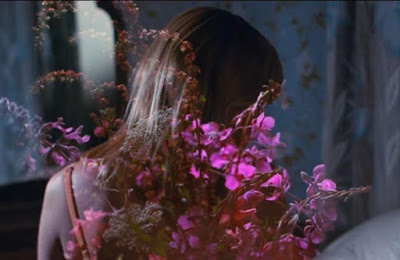Just how much substance is required to support a film’s
aesthetic? The answer, of course, varies from viewer to viewer and it is a
preference one should already have in mind before seeing the directorial debut
of sisters and fashion designers Kate and Laura Mulleavy. Visually distinct, Woodshock commits to a hypnotic,
Seventies-esque vibe that many will feel comes at the expense of narrative
clarity.
Theresa (Kirsten Dunst) has just lost her mother, helping to
ease her suffering via assisted suicide. It was done using a cannabinoid
substance provided by Keith (Pilou Asbæk), her boss at a medical marijuana
dispensary. Depressed and isolated in her grief, neglectful of and neglected by
her boyfriend (Joe Cole), Theresa fixates on a momentary hallucination
experienced when lighting the cigarette for her mother. When she starts
experimenting with the drug herself reality and delusion bleed together in
frightening ways.
Woodshock defies a
more detailed explanation in the same way that it’s impossible to describe a
dream and have it make as much sense to the listener as it did to the dreamer
while asleep. This is a film meant to be experienced, not just viewed. Every
frame looks as though it passed through an Instagram filter, a heavy,
sepia-toned haze that went out of style several years ago. The natural world
features heavily in both reality and delusion: spiders crawling through a bouquet,
wildflowers atop a cake or floating in a bath, the ominous old-growth forest
that edges in on Theresa’s house. Many frames could double as advertisements
for Urban Outfitters…and therein lies the primary shortcoming of Woodshock.
 |
| Kirsten Dunst stars in the stylized Woodshock |
For all of their aesthetic achievements—and this is a film
overflowing with gorgeous imagery—the Mulleavy sisters apparently forgot to
provide any underlying support to accompany their visual bonanza. Is Woodshock a movie about grief? Guilt?
Moral ambiguity? It’s a discussion rendered uninteresting thanks to paper thin
characters further hampered by a lack of context. As Theresa’s addiction grows
and the surreal actions and images pile up, it’s difficult to pinpoint the
magnitude of her unraveling because we know nothing about who she was before
her mother’s death. Whatever hints at a broader meaning the script contains are
so subtle they border on nonexistent. Stripped of all its stylings, Woodshock comes up painfully short on
soul.
The role of Theresa is a hefty burden. Dialogue is thinly
dispersed and multiple scenes can pass with no more than a word or two spoken.
Ms. Dunst delves into the role with a sense of earnest, in large part
responsible for the expectation of deeper meaning that sadly never
materializes. It’s a choice some might call brave and she’s talented enough to
find some success with it. Asbæk’s pot-dealing boss is too uneven,
played with a strange mixture of menace and concern. The score by Peter Raeburn
favors tone over melody and pairs well with the color-conscious cinematography
of Peter Flinckenberg.
There are undoubtedly viewers with whom Woodshock will succeed, although they likely won’t amount to very
many in total. This is a pleasing instance of truth in advertising for A24,
whose trailers sometimes sell a slightly different film than they’re releasing
(see: The Witch and It Comes at Night, both excellent movies
with questionable marketing choices). If Woodshock’s
lone trailer elicited excitement then don’t drag your feet and be sure to jump
on its limited release. But if you were left wondering if there was any pith
beneath the pretty surface, then rest assured: what you see might not always be
real, but it is all you’re going to get.
RATING: ★


No comments:
Post a Comment